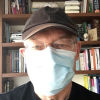Latest questions:
Trending questions:
Hot questions:
Natural therapies versus Pharmacological treatments
I am against the indiscriminate use of sleep inducing drugs for general sleep problems. However diet and eating at more appropriate times along with possibly try some natural therapies like Valerian can often lead to a more natural sleep pattern developing.
Just taking drugs to enter often a strange sleep pattern, often seems to give quantity of sleep but not quality of a normal sleep pattern.
I know that in some cases the pharmacological path is needed, but who makes that decision best and with what justification?
9 answers
There a number of modalities that help with sleep quality and duration that are NOT pharmaceuticals and ARE supported by established clinical trials (just as any Rx modality would be). Melatonin is the most common, but there are often errors here in thinking that more is better. in the case of melatonin More is worse. WHY? It is a hormone and the receptors desensitize when it is exposed to an excess of the ligand - that means it becomes less effective even to your own melatonin. Hops is good - it is why beer makes one sleepy. Excellent data on saffron extracts to reduce anxiety that impacts sleep. Theanine is an amino acid in tea, chocolate that is known to be effective. An asparagus extract is also supported by clinical trials. Finall,y passionfower is another, often linked to reduced anxiety. All have solid clinical trial support for applications in sleep improvement.
What a strange question. Without specific diagnosis / description of the condition being available, only a general answer can be given. Ultimately, it is up to each individual patient to decide whether to accept or not treatment proposed / offered by a physician.
Thanks Mark for your input. I've read ofd some of those therapies. My question is when will the medical professionals routinly start to suiggest trying these before a pharmacological script.
In Australia it IS beginning to happen with some doctors with Melatonin, Valerian, Saffron, etc but it is only the younger GPs who read the articles that are taking that course.
Natural therapies can be dangerous as people don't realise how poweeful they can be and the "if one helps, two will be better" thought can be dangerous as is the case with Rx drugs.
Are natural therapies and other like non-blue light being used to assist in developing circadian sleep cycles, being used in other countries?
ALL therapies should be judged and used based on VALIDATED data; however, validation is often missing for "natural" therapies.
One way to characterize natural remedies as those that work for an individual to produce results. As each person's response is individual, studies will not yield sufficient conclusive data one way or the other. Rather that looking at if from a medicinal way, consider that many of the naturopathic approaches either work or do not work based on the symptoms, and of course the individual biochemistry of the person using a remedy. Many remedies have been associated with the placebo effect and show the trials would be erroneous if that effect were present.
Common sense says if it works for you use it. It may not work for anyone else.
I understand this. But in this case it is necessary to present a “natural therapy” as such and clearly state that it has not been validated and that no indication or likelihood of efficacy can be given. Promoting it at the same level as fully validated and approved therapies is at least unethical, and very likely worse.
Karel, if after giving information regarding a natural remedy and the appropriate disclaimers, if a patient chooses to avail themselves of something they wish to try, that is not unethical if after trying the remedy their clinician can acscertin if it worked or not for them with their first hand description of the outcome. Since we know of the pacebo effect, individual clinicians will learn more about how their patients response to such remedies. We also know as professionals researching ofrr the counter effectiveness of remedies that have been studied we can at least enlighten the patient to our findings and refer them to sources for their own research. How often are clinicians asked by patients to try something off the beaten path of recommended treatments from natural remedies or family remedies.
Colin Johanson. Regarding your question "when will the medical professionals routinely start to suggest trying these before a pharmacological script" . It all depends down to the medical professional training and experience by him/herself. For example, current medical school does not teach much about nutrition, diet and functional food. Furthermore, current medical school does not focus in other alternative such as physiotherapy, acupuncture, herbal study, chiropractic, hypnotherapy.... The main focus of medical school training is heavily base on the study of disease (pathology) and pharmacology. Thus, it is a norm that most medical practitioner would prescribe pharmacological drugs at their first encounter because they are "trained to" and the only knowledge they had (they might be skeptical about the efficacy of non conventional treatment too) and to prevent any legal law sue issue that could raise from their unconventional treatment. Hence, only medical practitioner with additional studies or prior study of other subject such as nutrition, functional food, chiropractic would be more "open" in their medical management and would explore more option for their patient prior prescribing pharmacological drug as 1st line treatment management.
Exactly. And on what basis would a physician prescribe a treatment that is not validated by formal clinical studies? When at best the suggested medication may have a GRAS designation which is given on the basis of historic safety but not efficacy? When it comes to alternative medicine, patients are always free to consult alternative-medicine specialists, for example acupuncturist, herbalist, hypnotists, etc., physiotherapist or seek advice on lifestyle perhaps from a nutritionist or similar. It would be highly unethical for a medical profesional to prescribe a treatment that in his view is not the best option as based on existing data.





